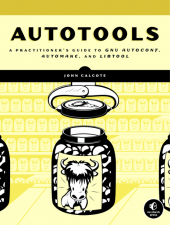Page 28:
Line 7 of Listing 2-8 reads: main.o: main.c. It should instead read: display.o: display.c.
Page 69:
Listing 3-10 should read as follows, with the final three lines added to the end of the listing:
...
# VPATH-related substitution variables
srcdir = @srcdir@
VPATH = @srcdir@
...
jupiter: main.c
$(CC) $(CPPFLAGS) $(CFLAGS) -o $@ $(srcdir)/main.c
...
Page 87:
Line 3 of Listing 3-23 reads:
$(CC) -I. -I$(srcdir) -I.. $(CPPFLAGS) $(CFLAGS) -o $@ main.c
It should instead read:
$(CC) $(CPPFLAGS) $(CFLAGS) -I. -I$(srcdir) -I.. -o $@ $(srcdir)/main.c
Page 93:
Line 9 of Listing 4-2 reads:
$(CC) $(CFLAGS) $(CPPFLAGS) -I. -I$(srcdir) -I.. -o $@ main.c
It should instead read:
$(CC) $(CFLAGS) $(CPPFLAGS) -I. -I$(srcdir) -I.. -o $@ $(srcdir)/main.c
Line 13 of Listing 4-3 reads:
$(INSTALL) –d $(DESTDIR)$(bindir)/jupiter
It should instead read:
$(INSTALL) -d $(DESTDIR)$(bindir)
Page 101:
The final three lines of Listing 4-2 read:
jupiter: main.c
$(CC) $(CFLAGS) $(CPPFLAGS) -I. -I$(srcdir) -I.. -o $@ main.c $(LIBS)
...
They should instead read:
jupiter: main.c
$(CC) $(CFLAGS) $(CPPFLAGS) -I. -I$(srcdir) -I.. \
-o $@ $(srcdir)/main.c $(LIBS)
...
Page 104:
The final four lines of Listing 4-2 read:
jupiter: main.c
$(CC) $(CFLAGS) $(DEFS) $(CPPFLAGS) -I. -I$(srcdir) -I.. \
-o $@ main.c $(LIBS)
...
They should instead read:
jupiter: main.c
$(CC) $(CFLAGS) $(DEFS) $(CPPFLAGS) -I. -I$(srcdir) -I.. \
-o $@ $(srcdir)/main.c $(LIBS)
...

